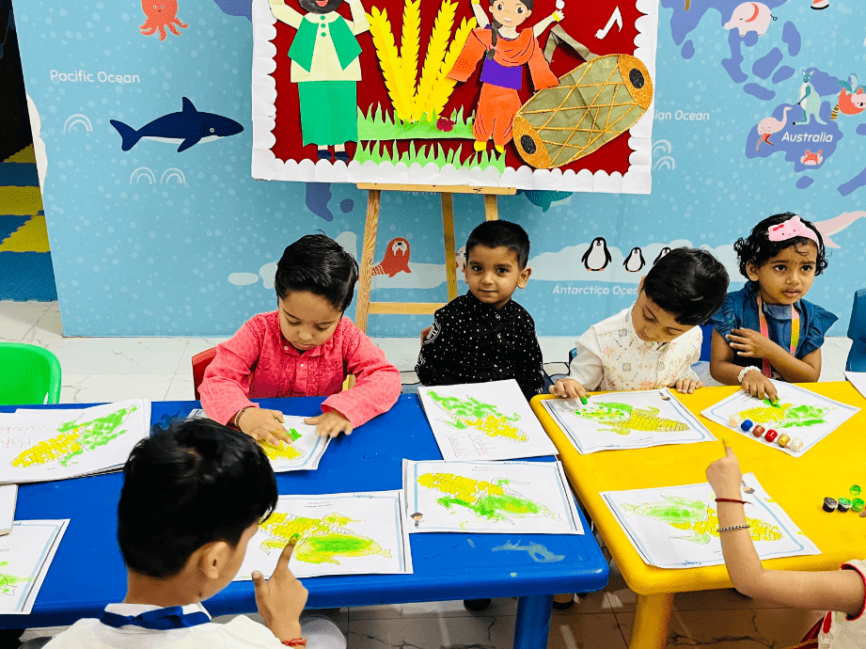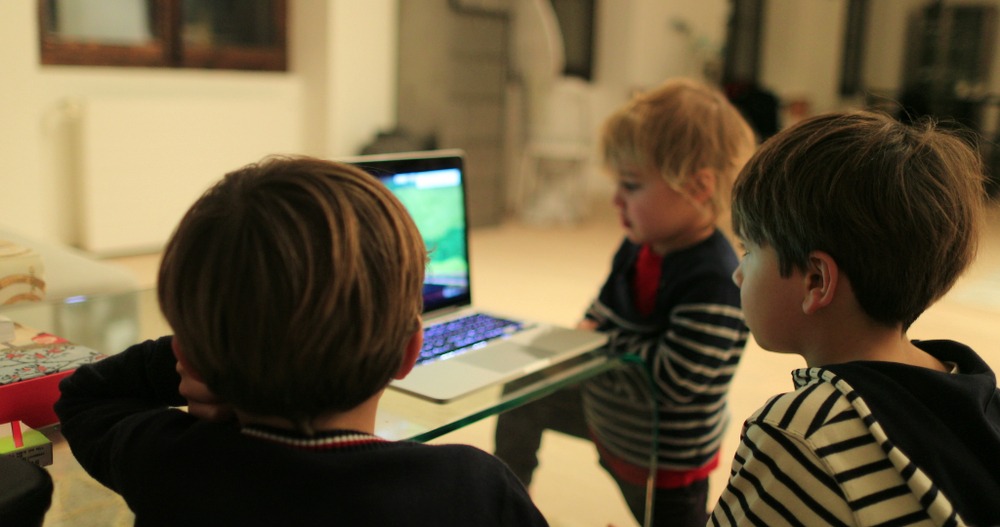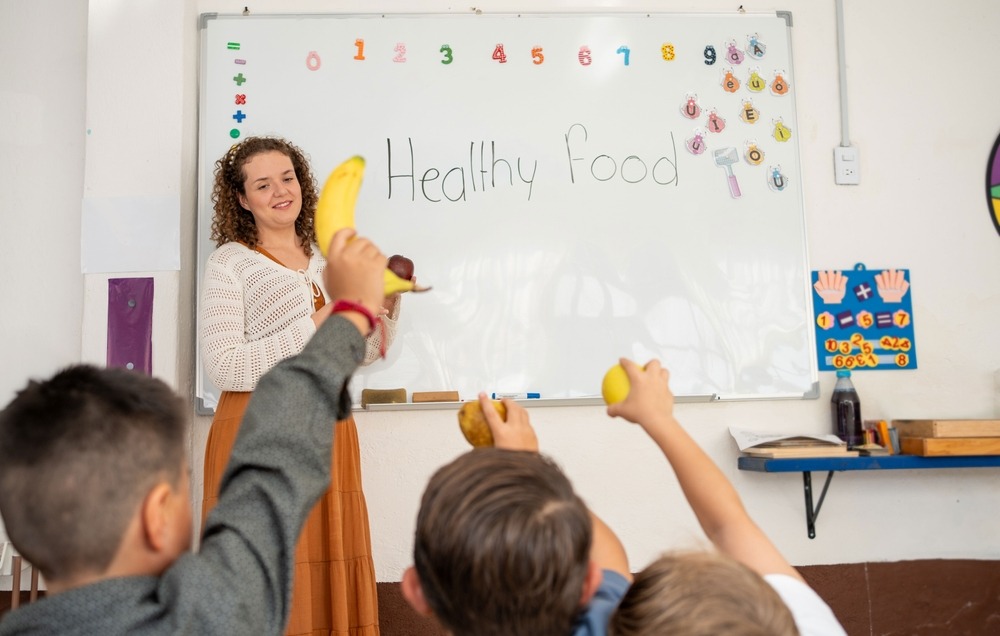Our teachers are extremely important in directing how our kids use technology. They encourage children to think critically about the content they are interacting with by posing open-ended questions and taking an active role in technology-related activities.
We also make sure that technology and experiential learning are balanced. To offer a well-rounded educational experience, our curriculum include group projects, sensory play, and outdoor recreation.
Introduction
Our lives are now completely surrounded by technology, which is transforming many sectors of the economy, including education. Early childhood education has seen an increase in interest in utilizing technology in recent years. We at Duscha Preschool are aware of how important technology is to improving young children’s educational experiences.
Our preschool seeks to give our pupils an interesting and participatory environment through the smooth integration of technology. We support the development of cognitive, social, and emotional abilities by utilizing interactive whiteboards, iPads, and age-appropriate educational apps.
We ensure that our students obtain a well-rounded education by guiding our approach to technology in early childhood education with the help of research and best practices. To promote creativity and critical thinking, we think it’s important to find a balance between technology and conventional teaching techniques.
The Importance of Technology in Early Childhood Education

In today’s technology-driven world, early exposure to technology has become essential for young children. Incorporating technology in early childhood education in Ashiyana has numerous benefits. Firstly, it helps children develop essential digital literacy skills from a young age. They learn how to navigate digital platforms, use educational apps, and understand the basics of technology.
Technology also improves motivation and involvement in the classroom. Children are engaged and learning becomes more fun when educational games and multimedia content are used to create interactive learning experiences. Higher levels of involvement have the potential to enhance retention and improve academic performance.
Moreover, technology allows for personalized learning experiences. Educational apps and software can be tailored to meet individual learning needs, allowing children to progress at their own pace. This level of customization helps children build confidence and develop a love for learning.

Benefits of Using Technology in preschool
Both early childhood educators and students can benefit greatly from using technology. First of all, technology makes a wide range of instructional resources accessible. Students can access virtual libraries, conduct extensive subject research, and engage in interactive learning activities with only a few clicks.
Additionally, technology facilitates communication and teamwork among students. Thanks to internet tools and platforms, kids can work together on projects, share ideas, and receive feedback from their peers. This cooperative learning environment fosters teamwork, social development, and communication abilities.
Technology provides means of self-expression and creativity. Children can create stories, multimedia projects, and artwork using computer tools. This improves their capacity for critical thought, creativity, and problem-solving.
Challenges and Concerns of Integrating Technology in Early Childhood Education
While there are numerous benefits to incorporating technology in early childhood education in Aashiyana ,It is critical to address the difficulties and worries connected to its integration. The risk for excessive screen time is one of the main concerns. A well-rounded childhood for children requires finding a balance between technology use and other activities.
The requirement for proper supervision and instruction is another difficulty. Young children might lack the self-control needed to use technology on their own. In order to guarantee that students are using technology in an age-appropriate and instructive manner, it is imperative that parents and instructors keep an eye on their usage.
Concerns have also been raised regarding the possible harm to social interactions. Over-reliance on technology can impede the acquisition of critical social skills. Creating opportunities for in-person encounters and cooperative activities is important.
Best Practices for Incorporating Technology in Preschool
To ensure the successful integration of technology in early childhood education, it is important to follow best practices. Firstly, it is crucial to align technology use with the curriculum and learning objectives. Technology should be seen as a tool to enhance learning, rather than a standalone activity.
Secondly, it is important to provide age-appropriate and high-quality digital resources. Educational apps, games, and websites should be carefully selected to ensure they promote learning and provide meaningful experiences for children.
Furthermore, it is essential to provide guidance and supervision during technology use. Teachers should actively participate in children’s technology interactions, asking questions, and encouraging critical thinking. This helps children develop digital literacy skills and ensures their safety online.
Moreover, it is important to offer a balance between technology and hands-on, experiential learning. Traditional learning methods, such as outdoor play, arts and crafts, and sensory activities, should still be a part of the curriculum. This holistic approach ensures a well-rounded educational experience for young children.
Examples of Technology Tools and Resources for Early Childhood Education
There are numerous technology tools and resources available for early childhood education. Duscha preschool offers interactive and age-appropriate content that covers a wide range of subjects.
Tablets and interactive whiteboards provide opportunities for hands-on learning and collaboration. They can be used for drawing, writing, and solving puzzles, enhancing children’s fine motor skills and cognitive development.
Additionally, there are online platforms and websites that offer virtual field trips, storytelling, and science experiments. These resources provide immersive learning experiences that supplement classroom instruction.
Case Study: How Duscha Preschool Utilizes Technology in Their Curriculum

At Duscha Preschool, technology is skillfully incorporated into our curriculum to improve our students’ educational experiences. We make use of educational apps that support critical thinking, creativity, and problem-solving abilities while also being in line with our learning objectives.

Another essential component of our technology-based learning strategy is parent involvement. We encourage parents to take an active role in their child’s educational path by offering them tools and advice.
Parent Involvement in Technology-Based Learning
Parents play a vital role in supporting technology-based learning at home. They can create a safe and conducive environment for their children’s technology use by setting boundaries and establishing rules. It is important for parents to monitor their child’s screen time and encourage a healthy balance between technology and other activities.
Training and Professional Development for Teachers in Using Technology
To effectively integrate technology into the classroom, teachers require training and professional development opportunities. Duscha Preschool provides ongoing training for our teachers, ensuring they are equipped with the necessary skills and knowledge to incorporate technology effectively.
Professional development workshops cover topics such as selecting appropriate educational apps, integrating technology with curriculum standards, and promoting digital citizenship. These workshops provide hands-on training and allow teachers to share best practices and strategies.
Join Duscha Today!
At Duscha Preschool, we value technology’s role in teaching young children. We aim to provide an education that uses both the latest technology and classic teaching methods. This way, we help our students become confident and ready for the future.
Come join us at Duscha Preschool as we use technology in smart and exciting ways to teach our young students. Together, we can shape a bright future for early childhood education with the help of technology.
Here are just a few of the programs we offer at Duscha PreSchool & Day Care:
- No Tuition Fee Hike for the Next Academic Session
- Modern Preschool Technology-Oriented Infrastructure
- Air-Conditioned Smart Classes
- Safe Pickup and Drop Facility
- Montessori Way of Learning
- Dedicated Computer Labs and Library
- Quarterly Health Check-up Camp for Duscha Students
- Experienced Teachers
- Affordable Fees
At Duscha PreSchool & Day Care, we understand that every child is unique, and we strive to create a learning environment that is tailored to their individual needs. Our experienced staff works closely with parents to ensure that each child receives the support and attention they need to thrive.
So if you’re looking for the best kids school in Ashiyana, Lucknow, look no further than Duscha PreSchool & Day Care. With our commitment to excellence, individualized attention, and top-notch educational programs, we are the best choice for parents who want to give their children a strong foundation in education.
But don’t just take our word for it – come see for yourself! Schedule a tour of our air-conditioned play school in Lucknow today, and discover why Duscha PreSchool & Day Care is the best school in Ashiyana, Lucknow.
Frequently Asked Questions
The best technologies for toddlers are those that combine learning with fun in a safe manner. Interactive storybooks and educational apps that encourage basic skills like colors, numbers, and letters are ideal. Tablets specifically designed for toddlers, with sturdy cases and parental controls, provide a good mix of entertainment and education. Additionally, simple musical instruments that are operated electronically can enhance sensory development.
Some potential challenges of using technology in early childhood education include the risk of decreased physical activity as children may spend more time on devices. There’s also the concern about screen time affecting their developing eyesight and sleep patterns. Additionally, relying too much on technology can limit face-to-face social interactions, which are crucial for developing social skills. Ensuring that content is age-appropriate and educational is another challenge, as not all apps or digital content are beneficial for learning.
Technology can greatly support children with special needs in early childhood education by offering personalized learning tools and resources. Interactive apps and software can adapt to each child’s unique learning pace and style, making education more accessible. Technologies like voice-to-text and touch screens help children who may have difficulty with traditional learning methods. Additionally, visual and auditory aids can enhance understanding and retention for children with sensory challenges.
Technology can significantly boost creativity and critical thinking in young children by providing interactive tools that encourage exploration and problem-solving. With apps and games designed for learning, children can engage in tasks that challenge them to think outside the box and come up with creative solutions. Technologies like virtual reality or coding toys help children visualize complex concepts and develop skills like logical thinking and persistence.



